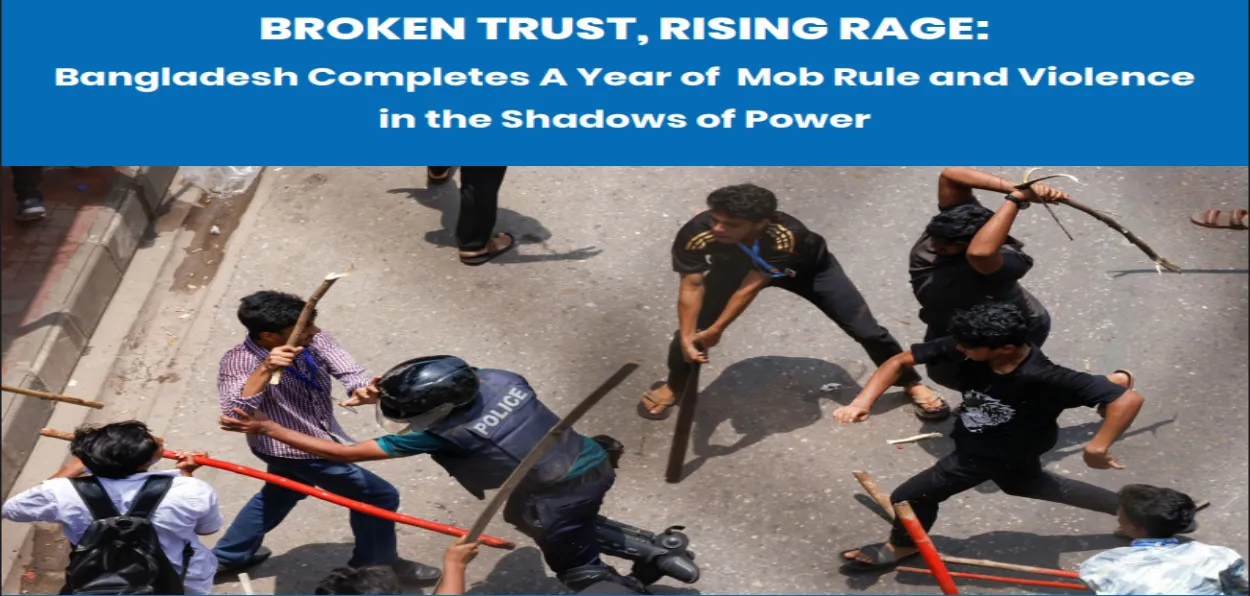
New Delhi
Bangladesh has seen a wave of extrajudicial killings - at least 637 people lynched or brutally killed by mobs - since the deposition of Prime Minister Sheikh Hasina in a mob-driven coup in August 2024. This includes 41 police officers.
Shockingly, Bangladesh had recorded only 51 mob killings in 2023, and this means that after the forced exit of Sheikh Hasina, the country has seen a 12-fold increase in mob killings.
This is based on the recent report of the Canada-based Global Center for Democratic Governance (GCDG). The report "Broken Trust; Rising Rage - Bangladesh Completes A Year of Mob Rule and Violence in the Shodows of Power," lists the photos, names, and details of all the 637 people killed in mob violence between August 2024 and July 2025.
This wave began after the political chaos that followed the 15-year-long ouster of Prime Minister Sheikh Hasina in a popular uprising in August 2024. The resulting political vacuum and the weakness of state institutions severely affected the rule of law, leading citizens to take justice into their own hands.
The report stated that 24 people were burnt alive at “The Zubair Hotel” in Jessore on August 4, 2024, while 182 people were burnt alive inside “Gaji Tyres” in the Roopganj area of Narayanganj on August 25. The identities and details of most of the victims could not be made public, the main reason for which has been stated to be strict media censorship. Due to strict censorship on the media, we could not get complete figures of all the mob killings.
The report says, "The interim government, led by Nobel Laureate Muhammad Yunus, has vowed to crack down on vigilante violence. Authorities have promised a 'zero tolerance' approach and launched nationwide campaigns promoting legal awareness and community policing.
"However, prosecution remains rare, with only a handful of arrests about mob killings, and fewer still leading to convictions. Critics argue that the government has prioritized political consolidation over the
rule of law, focusing more on purging remnants of the former regime than restoring judicial order. Meanwhile, public trust in institutions continues to plummet, fueling the very violence the state seeks to prevent. Beyond the numbers, the rise in mob violence has left deep psychological scars on communities across Bangladesh.
"Fear has become a daily companion in many neighborhoods. Parents are hesitant to let children walk alone, and shopkeepers speak in hushed tones when discussing political topics. A recent survey by the South Asian Network on Economic Modeling (SANEM) found that 71% of Bangladeshi youth believe that mob violence is now a regular part of public life, and 47% fear becoming a target of politically motivated attacks.
"Unless urgent and systemic reforms are made, ranging from police restructuring and judicial independence to digital misinformation controls and civic education, mob justice may become a permanent feature of Bangladesh’s political landscape.
"The last year has shown that when institutions fail, mobs rise. The question facing Bangladesh now is whether it can reclaim the rule of law or whether the crowd, not the court, will continue to decide who lives and who dies."
The report says the published list of the dead is incomplete because of the censorship and non-cooperation from the Bangladesh Police in furnishing information.
This sudden increase reflects the weakening of state control amid a severe decline in the rule of law and political instability. The fall of a long-standing government created a power vacuum and shook public confidence in the judicial system, which is now widely seen as non-existent or subject to political agendas.
With police forces overstretched, courts paralyzed, and local leaders targeted or in hiding, the public began to take justice into their own hands. Public spaces, once considered safe under the law, have now become centers of mob killings based on suspicion, rumors, or political vendettas.
While many incidents began with allegations of theft or harassment, a large proportion of the violence had a political or sectarian overtone.
According to local human rights groups, more than 70 percent of those killed by mobs since August 2024 belonged to the former ruling Awami League party or its student and labour wings.
Other victims included minorities, particularly Hindus and Ahmadiya Muslims, who were often accused of blasphemy or conspiracy based on viral social media posts, for which there was no evidence.
In a heartbreaking incident, Lal Chand Sehg, a Hindu social worker, was killed in public outside Mitford Hospital on 9 July 2025. His killing was live-streamed on social media platforms, sending shockwaves of fear and anger across the country.
The report says social media has become a double-edged sword, exposing injustice on the one hand, but also fueling hatred and fear on the other.
"Misinformation and inflammatory content have played a key role in mobilizing crowds in a matter of moments to launch attacks.
ALSO READ: Jamaat's rise may lead Bangladesh to path of radicalisation
In one incident in Chittagong, a false post was spread on Facebook, claiming that a local Hindu man had desecrated the Quran. The rumor resulted in two people being killed and several houses being set on fire. "The post was later proven to be false, but the damage was done."
